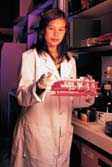 Antigen,
meet antibody Once that happens, all cells created by the retrovirus have the same out-of-whack regulatory mechanism. "Retroviruses jam the regulatory mechanism of cells so that they're stuck in the 'on' position," says Torres. "Each one of the cells transformed by the virus also lacks this regulatory mechanism, so they keep reproducing forever. They're immortal." Cancer vaccines tend to work differently from conventional vaccines in that they are used for treatment rather than prevention. Several trials are under way for vaccines to breast, prostate and colon cancer and melanoma. These work by stimulating cytokines, natural tumor killer cells and other components of the immune system to fight cancer. Some experimental vaccines use the cancer patient's own tumor cells to create antibodies. These vaccines are a type of immunotherapy, using the body's own defenses to fight cancer. The HTLV vaccine Torres is working on is a combination that will both protect against infection by allowing the immune system to recognize HTLV as an antigen while killing existing cells infected with HTLV. Torres hopes his work will further scientific progress towards finding vaccines for other cancer viruses. "It's a way to open the field," says Torres. "It's like building a car. The first one needs to be very simple. Then you can improve upon it." "And besides, if we can stop even a small percentage of people from suffering virus-related T-cell leukemia, that's better than what we have to offer them now."
Home |
Table of Contents |
To our Readers |
Building on Basics UC Davis Health System | © 2000, 2001, 2002 UC Regents. All rights reserved. |
Maria Paz Carlos, a National Cancer Institute fellow, works with a peptide synthesizer. |

